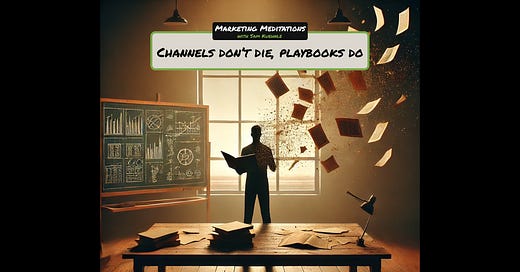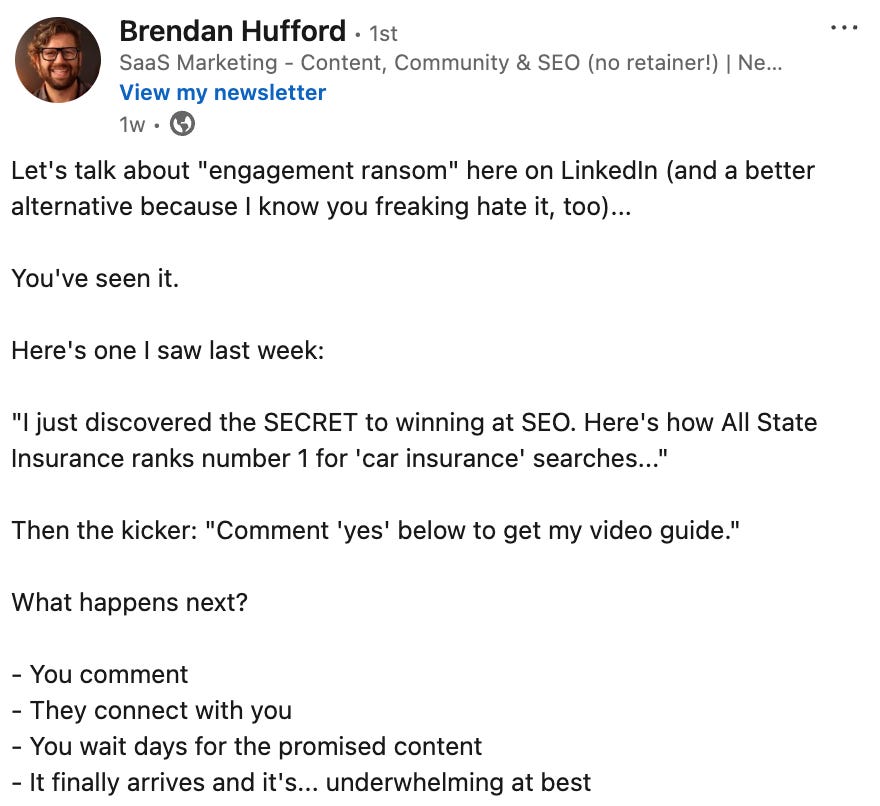Blanket “[Channel] is dead!” statements are really easy to make. And honestly I think most people make them at this point simply as bait to grab attention/engagement.
But to me, any time I see someone say something is “dead,” I immediately translate that as that individual’s strategic, problem-solving ability is what’s “dead.”
Sponsor: Default
We’ve come a long way since the days of “A member of our team will be in touch within the next 72 hours” upon a prospect submitting a demo request on a website. Automating the back + forth scheduling so the prospect could pick the date + time for their call upon form completion was a huge step forward.
And now we’re seeing the next one.
Default is levelling this up for organizations by going not just one, but multiple steps beyond this by looking at the overall job to be done and solving for that. So instead of stopping at helping the prospect pick a date + time for the call, here are just a few additional things Default is automating for teams:
Automatic enrichment of the lead + company with information relevant to you
Automatic qualification/disqualification based on pre-determined criteria
Automatically create leads, contacts, activities, and even opportunities within your CRM with the correct info appended
They gave me a sneak peek at what’s coming over the next few months as well, and I’ve got to say, I’m impressed and already working on migrating over to them.
Channels and mediums rarely die
Marketing. Sales. BDRs. Partner. Events.
Email. Paid ads. Cold calls. Video. Hell, even fax.
None of those are dead, despite countless claims every week that they are.
Platforms may come and go, but the overarching channel(s) + medium(s) rarely go away. What “dies” is the playbook being used on the channels and mediums.
What happens is that channels + mediums evolve as times do. Marketing and advertising have been around for centuries. The job to be done hasn’t changed much: attracting an audience to purchase a product/service. I could go through this same train of thought for the other 4 channels mentioned above (and that’s not even the exhaustive list of channels), but I think you get where I’m going with this.
Did we say marketing was dead when *lead gen* stopped being effective? No.
Did we say marketing was dead when *newspaper ads* stopped being effective? No.
Did we say marketing was dead when *Yellow Pages* stopped being effective? No.
Have you noticed a trend in the above? The channel isn’t what “died.” The playbook or platform is what dies.
Playbook + platforms are what “die”
Let’s use BDRs as an example channel right now that many are saying has “died.”
BDRs aren't dying. There is NOTHING wrong with the channel, but EVERYTHING is wrong with the standard playbook used.
Stealing a page from the lead gen > demand gen shift, was paid marketing broken? No. But the playbook being used was. All of the “leads” being generated weren’t converting to pipeline, let alone revenue. So we embraced the concept of dark social and what strong brand marketing can achieve for you, understanding that they would show up as “organic” or “direct” when they came back to our site ready to research more.
BDRs are currently going through the same thing marketing went through ~5 years ago. Activity volume goes up more and more every year, but the results are either staying the same, or in some cases, getting worse. Why? Because the current BDR PLAYBOOK is broken. Like the lead gen playbook of marketing, we’re trying to force prospects prematurely (and often, too aggressively) into the funnel.
BDRs are one channel in the go-to-market (GTM) ecosystem. Instead of viewing them as a silo in some awkward middle ground between sales and marketing, they should be used in a manner like how marketing has adopted a demand gen approach.
Here are some other examples highlighting why the issue is the playbook, not the channel:
Lead gen ebooks had their moment ~10 years ago
Talking head podcast clips had their moment ~3 years ago.
“Engagement ransom” is having its moment right now.
The playbooks will come and go. The platforms will come and go. But the ability to adapt to the market, trends, technology, algorithms, and more is what dictates what will/won’t work as time goes on. Remember: most best practices truly are “best” practices when they get started. They’re new. They’re different. They get higher engagement. They drive stronger results.
Then the market catches on. Others start following this new best practice “playbook” until it becomes best practice in the sense that best practice means doing the same thing as everyone else.
And this is why any time I see someone say something is “dead,” I immediately translate that as that individual’s strategic, problem-solving ability is what’s “dead.” Adaptating how we execute on a channel/medium as time goes on is what dictates if we’ll be successful as times goes on. Blaming the channel/medium is an easy cop-out for saying you don’t want to do the work to solve for the new times + think strategically.
Book quote of the week
I keep a commonplace book. I first learned about this concept from Ryan Holiday years ago when listening to him talk about how he does his research for books and would reference his commonplace book for quotes, stories, anecdotes, and more about specific topics.
Last week I shared a quote from a book that I said was “the right book at the right time” as serendipity had me coming across the line at just the right time with what I had going on at work. I liked how it felt tying in a relevant quote to the newsletter, so I’ve decided I’m going to pull out my commonplace book for this section moving forward and highlight something I think ties a bow on what I covered earlier in the newsletter.
For today, I’m going to honor Ryan for leading me to the commonplace book idea by highlighting a quote from one of his books that I think ties in incredibly well with what’s at the root of why we say a channel or practice is “dead.” We default to saying things are “dead” because they aren’t driving the results for us that they once did. And this is where I think this passage from Ryan hits the nail on the head.
“Take a step back, then go around the problem. Find some leverage. Approach from what is called the ‘line of least expectation.’ What’s your first instinct when faced with a challenge? Is it to outspend the competition? Argue with people in an attempt to change long-held opinions? Are you trying to barge through the front door? Because the back door, side doors, and windows may have been left wide open.”
The Obstacle is the Way, Ryan Holiday
In case you missed these this week
Friday health thoughts: "not being fit is more likely to kill us than smoking"
See you next Saturday,
Sam





